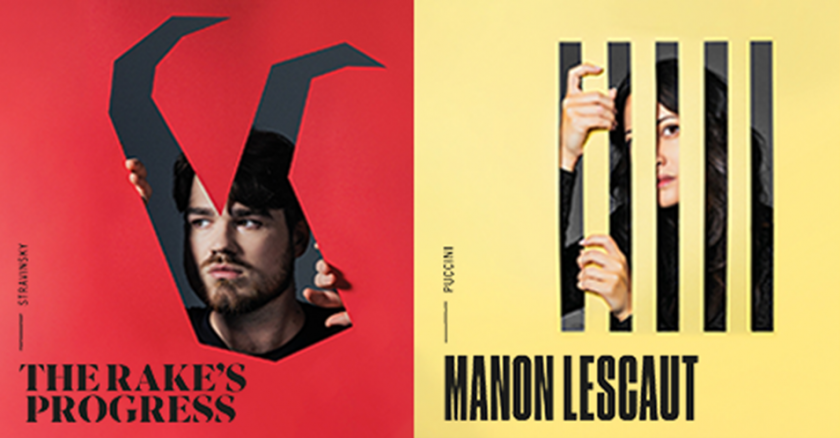
Q & A with the cast of ETO's The Rake's Progress and Manon Lescaut
English Touring Opera will be arriving at Cambridge Arts Theatre in just a few weeks with two fantastic operas: Stravinsky’s The Rake’s Progress and Puccini’s Manon Lescaut. We had a chance to chat with cast members Edward Hawkins and Amy J. Payne about both shows and the importance of opera today.
What is your favourite thing about being a part of The Rake’s Progress/Manon Lescaut?
Edward Hawkins (Geronte, The Rake’s Progress): I would have to say the cast - they’re such a great bunch of people to be around and we’re all very supportive of each other. Being onstage with colleagues who are all rooting for each other is a very unique and special feeling.
Amy J Payne (Mother Goose/Naval Captain, The Rake’s Progress/Manon Lescaut): Working with such talented colleagues. It is so thrilling to witness your friends give such committed and skilled performances and I have never gotten over the excitement of singing with a professional orchestra. I hope I never do!
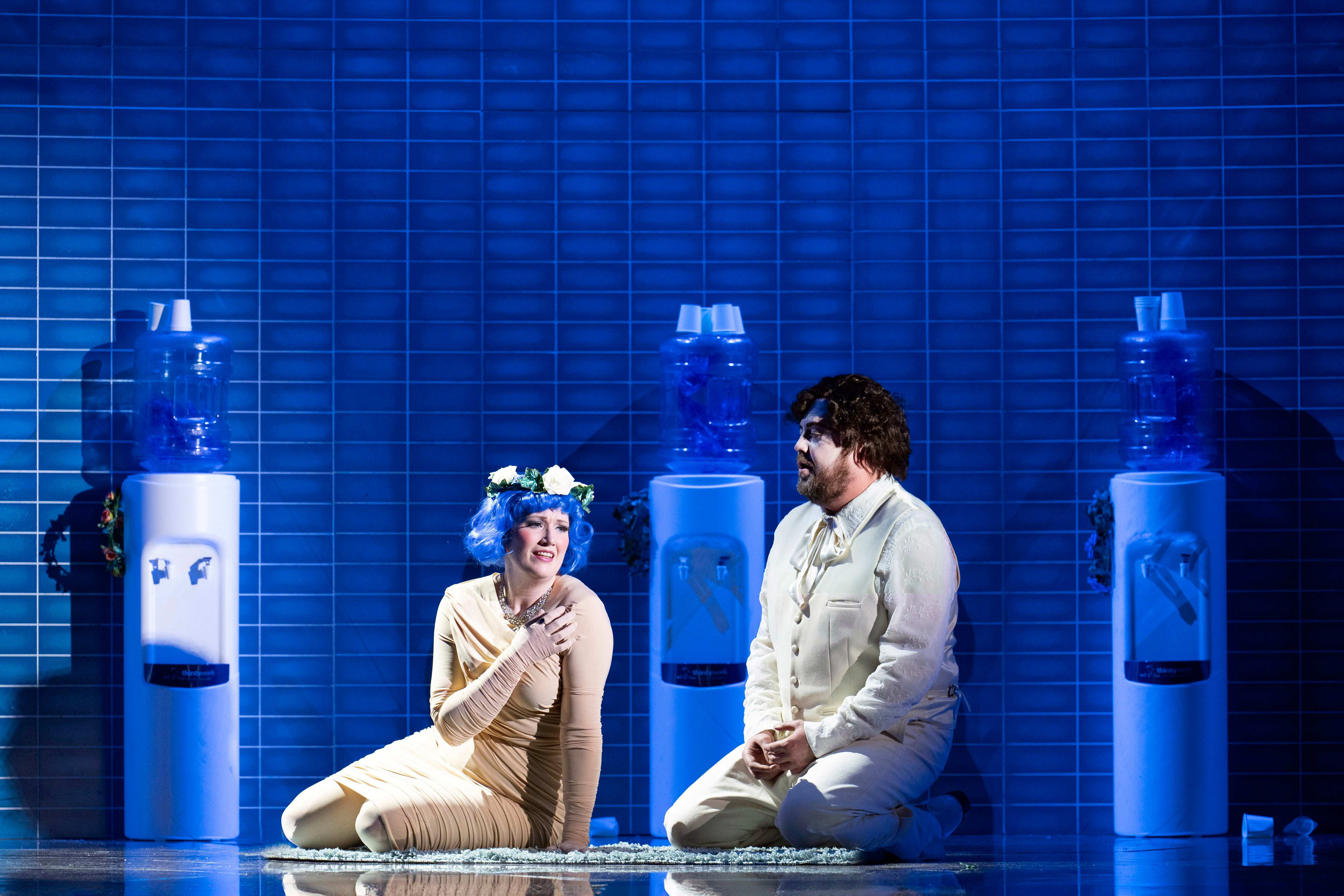
(Production shot from Manon Lescaut)
What makes The Rake’s Progress/Manon Lescaut important for today?
Edward Hawkins (Geronte, The Rake’s Progress): I think the director Jude really tried to highlight some of the contradictory expectations opera heroines have placed upon them - be free, but not in charge of your destiny; be strong, but also be at the mercy of men. In other words, plenty of resonance with Barbie!
Amy J Payne (Mother Goose/Naval Captain, The Rake’s Progress/Manon Lescaut): Manon Lescaut is unable to live as she truly desires, because she lives in a world controlled by men. Even the men who should have her best interests at heart (her father, her brother, her lover) either deliberately or unwittingly drive her to destruction. Even though the original novel was written in the 18h century and the opera in the 19th, unfortunately there is still much that rings true for women around the world today. Many women still experience this impossibility of choice and suffer the consequences of railing against their situation.
The Rake’s Progress is a morality tale, again originating in the 18th century, but one which still holds relevant warnings in our society today. I have recently been into secondary schools to work with teenagers on this piece and we found several parallels with current social phenomena and particularly with online dangers such as catfishing and email scams. Ultimately Tom Rakewell is brought down by greed and by denying his true self and I think there is an important message there too about valuing the right things in life to ensure your own happiness and mental well-being.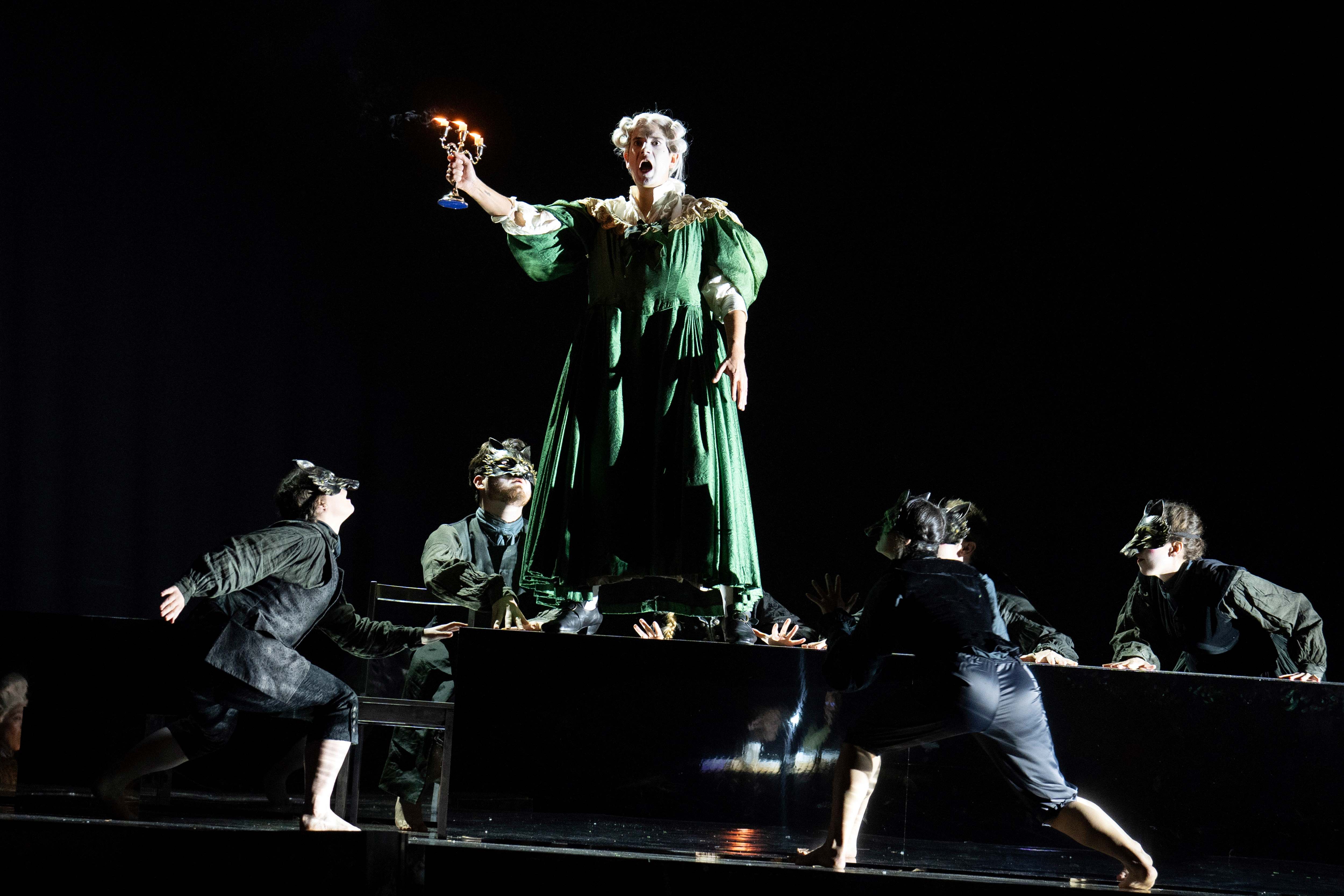
(Production shot from The Rake's Progress)
To follow up, why is opera important today?
Edward Hawkins (Geronte, The Rake’s Progress): I’m extremely passionate about the importance of opera as an unamplified medium. It might sound trivial, but opera is one of the few places where you are hearing the singing (and orchestra) come from its true point of origin, and I genuinely believe it provokes a primal and profound response in the listener. Also, all good opera seeks to simultaneously provoke a response to visual, musical and physical stimuli. It’s the ultimate storytelling medium, in my opinion.
Amy J Payne (Mother Goose/Naval Captain, The Rake’s Progress/Manon Lescaut): Opera has a bit of a PR problem in the UK and it would be wonderful to live and work in a country where this question would never even be asked, but here we are and of course I am more than happy to advocate for the art form and craft that has given me nearly a decade and a half of a career so far! Opera is difficult. It is difficult to master as a practitioner and it requires much of the audience too. It is important precisely because of this. It has driven some of the greatest musical talent in the world to the peak of their craft and provides the audience with an opportunity for awe and transportation like few other art forms can. I think the word ‘elite’ has come also to mean ‘inaccessible’, which has not been my own experience. I found my way to opera simply through a love of singing and music and a desire to be the best artist I could be. Opera challenges us all to be better and that is why it is important.
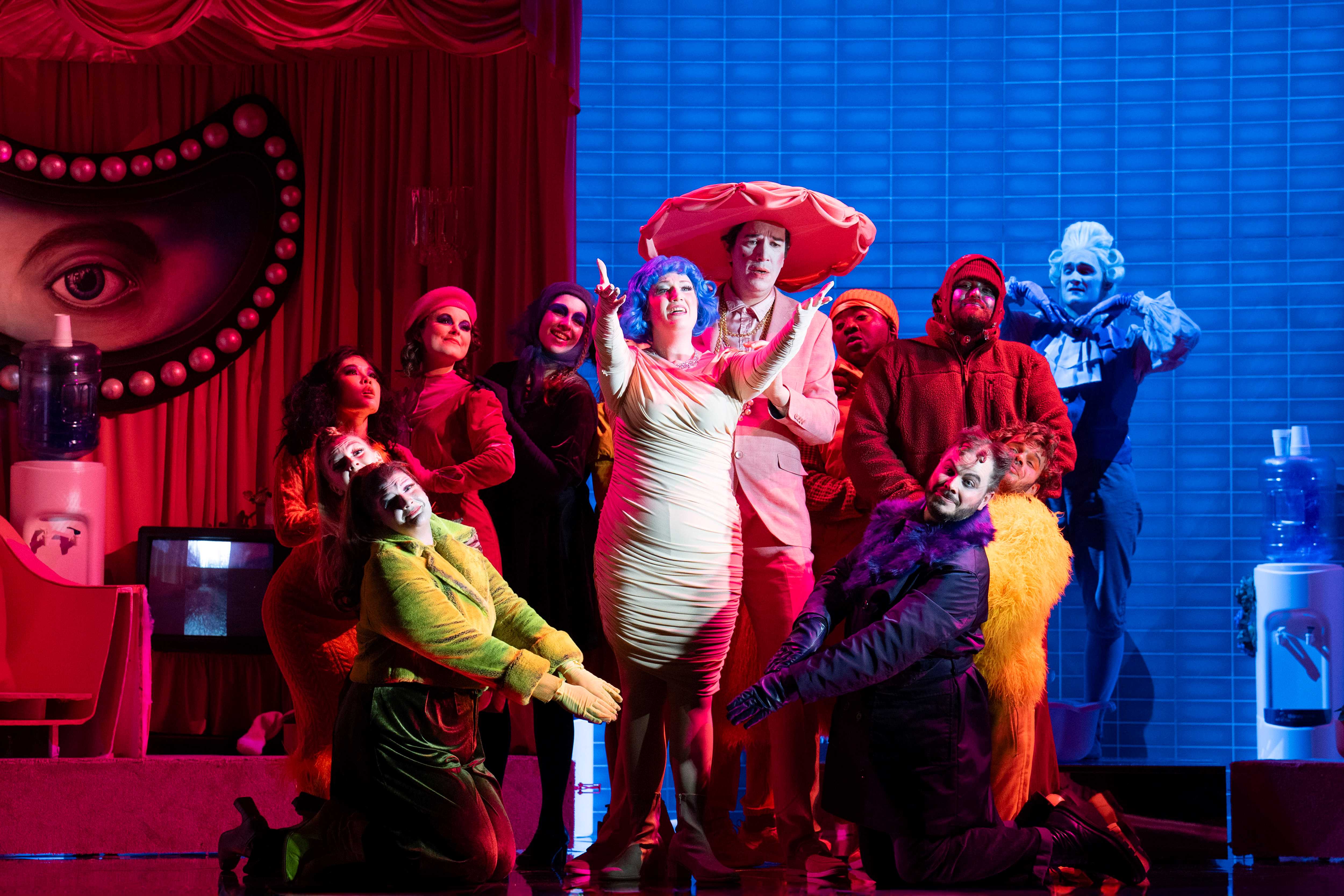
(Production shot from Manon Lescaut)
How do you expose the next generation to opera?
Edward Hawkins (Geronte, The Rake’s Progress): It’s a very good question. Some operas aren’t intended to be immediately accessible to young people, in the same way that some films or books aren’t, but that doesn’t mean that books and films aren’t an accessible medium. I think a lot of people are tripping over themselves to show that opera isn’t elitist, and in the process they underestimate their audience. The trick for the next generation, in my opinion, is never compromise on quality and accessibility. Strive to make every aspect of your show unmissable, and ensure tickets are never unobtainable. Both of these, of course, require the assumption that one cannot take a bulldozer to music education and arts funding and expect the next generation of artists and enthusiasts to spring magically from the ground fully-formed.
Amy J Payne (Mother Goose/Naval Captain, The Rake’s Progress/Manon Lescaut): I think wherever possible performances should be offered to schools and youth groups, either as free or subsidized tickets to theatres or opera companies should be bringing opera into schools etc. I am pleased to say ETO do both of these things and I believe this really helps to dispel the myth that opera is ‘not for me’.
How did you find your way into opera?
Edward Hawkins (Geronte, The Rake’s Progress): I trained as a trumpeter at university, and worked as a brass player and peripatetic teacher until my mid 30s. A dear singing teacher friend of mine had commented on my speaking voice in the pub one day and said I should give singing a go. I had private lessons for a few years, then auditioned for the Glyndebourne Chorus (having been diagnosed with testicular cancer two days before, but that’s another story!). On my first day at Glyndebourne, I had never been backstage at a theatre before. I spent four years learning the ropes there amongst amazing people, then decided to try and work as a soloist.
Amy J Payne (Mother Goose/Naval Captain, The Rake’s Progress/Manon Lescaut): Although I didn’t know it at the time, I think the die was cast when I was taken to see The Phantom of the Opera by Andrew Lloyd-Webber in London’s West End when I was about 8 years-old. I was absolutely blown away by the stage production and the whole experience of being in a large, commercial theatre. Whilst it became musicals that I loved as a child, that show and others like it introduced me to a classical style of composition and singing. Then, when I started having singing lessons at my state school, aged 15, this earlier experience meant I never once thought, “this is not for me”. Through my singing teacher I did my ABRSM singing exams and decided when choosing my A-Levels that I wanted ultimately to try for music college. I am happy to say I was successful and I trained at The Guildhall School in London, graduating from the Opera Studies course in 2011.
What three words would you use to describe The Rake’s Progress/Manon Lescaut?
Edward Hawkins (Geronte, The Rake’s Progress): Hallucinatory, Lush, Moving.
Amy J Payne (Mother Goose/Naval Captain, The Rake’s Progress/Manon Lescaut): Manon: cage, desire, control
Rake’s: temptation, regret, love
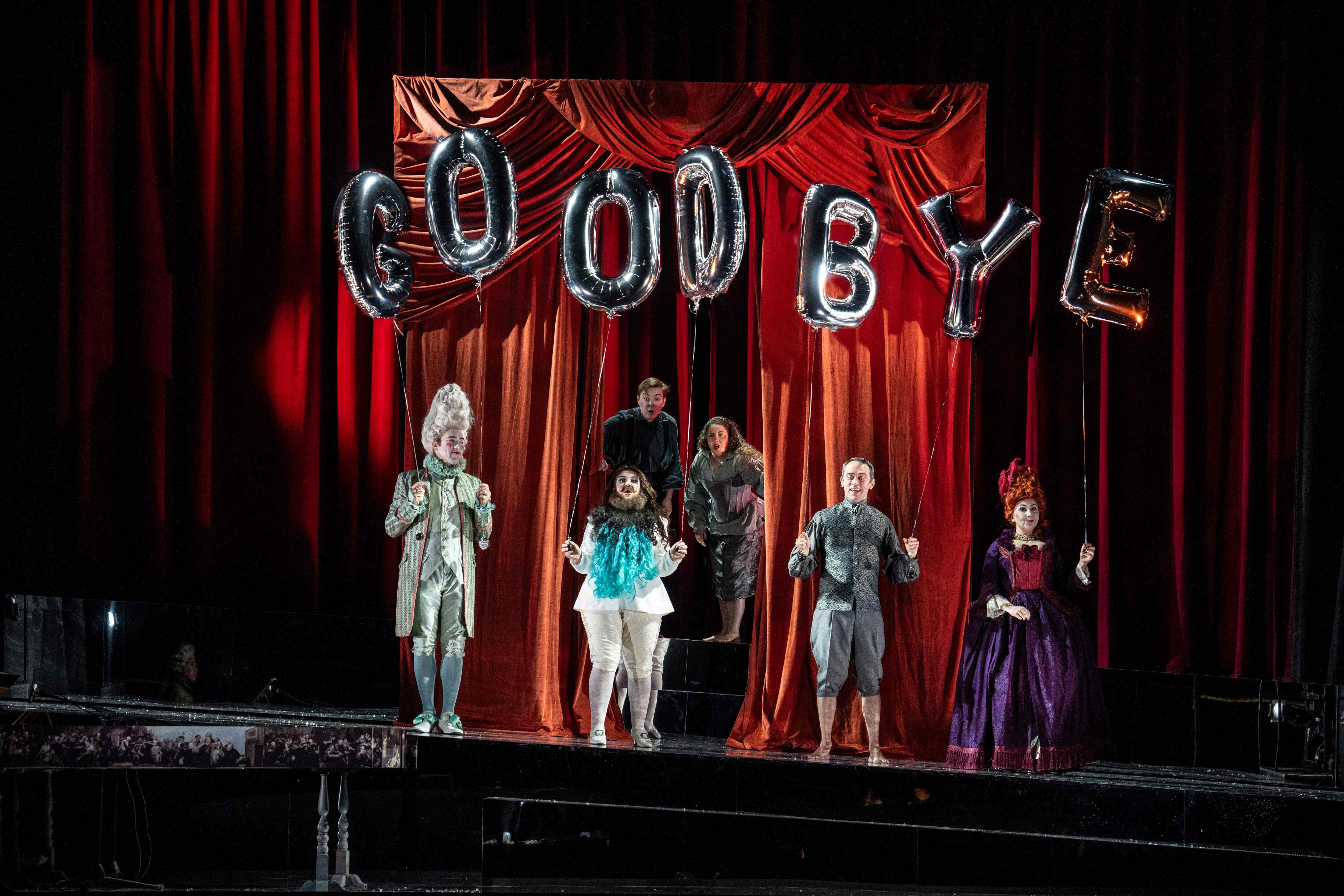
(Production shot from The Rake's Progress)
How does experiencing an opera differ from experiencing a play?
Edward Hawkins (Geronte, The Rake’s Progress): A film director once said that adding a soundtrack to a film is like adding a sense of smell to it. I think in a similar way, opera takes the format of a play and hugely expands the amount of information being imparted. The orchestra creates both context and subtext to the scene, and the character’s inner thoughts are simultaneously brought to life by music’s unique ability to express the inexpressible.
Amy J Payne (Mother Goose/Naval Captain, The Rake’s Progress/Manon Lescaut): ‘Opera’ is a catch-all term, which really encompasses centuries of styles across continents, but of course the main difference is that nearly all of the actors’ text will be sung rather than spoken. Opera requires an audience to listen in a different way. I am always amazed when watching a ‘straight’ play, how the actors command the space with how they shape the spoken word and the silences between. For opera singers, the composer has already made those decisions for us by and large and it is down to each individual to use their unique vocal colours to shape the text. When you think that each member of the orchestra is also doing the same with their instrument, it makes for ongoing conversations between the stage and the pit, which is the joy of live music.
English Touring Opera open their productions in Cambridge on Wednesday 1 May. If you'd like to know more about The Rake's Progress or for ETO's Manon Lescaut or book tickets, please click the show title.
Photography by Richard Hubert Smith.
